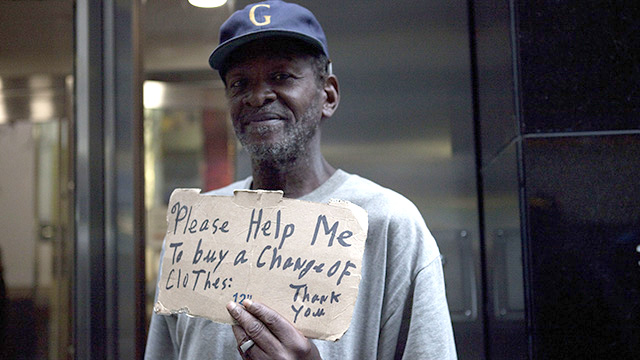This post first appeared at TalkPoverty.
This year, TalkPoverty.org and BillMoyers.com will recognize strong media coverage of poverty on an ongoing basis. To get that effort started, here’s a look back at some of the best poverty journalism in 2014. These 20 stories and op-eds drew attention to critical but under-reported issues, rebutted persistent myths, shed light on barriers to economic security and mobility, lifted up policy solutions, provided insightful commentary on media coverage of poverty, or even served as a catalyst for change. (Stories are listed in no particular order.)
Driven Into Debt
by Michael Corkery and Jessica Silver-Greenberg, New York Times Dealbook
This five-part investigative series explores the rise in predatory subprime auto loans and how they can trap low-income individuals in cycles of debt. (Don’t miss the accompanying videos.)
Working Anything but 9 to 5
by Jodi Kantor, New York Times
This in-depth article follows Jannette Navarro — a Starbucks barista and mother struggling to make ends meet — highlighting the effects of an unpredictable job schedule, particularly on parents. Soon after this story ran, Starbucks announced it would reform its scheduling policy.
Growth Has Been Good for Years. So Why Hasn’t Poverty Declined?
by Neil Irwin, New York Times Upshot
This important piece highlights how economic growth no longer translates into less poverty and busts two prevalent myths — that hard work is all it takes to escape poverty, and that public assistance provides “perverse incentives” against working.
What Happens When Your Pregnant Sister-in-Law Is Paralyzed in a Car Accident and Has No Insurance
by Harold Pollack, Washington Post Wonkblog
I can’t get enough of Harold Pollack’s Wonkblog interviews. This one features an interview with Andrea Campbell, whose sister-in law was paralyzed in a car accident a few years ago, throwing the whole family into crisis. In particular, this piece does a great job of illustrating how harmful and counterproductive asset limits can be.
Poverty More Common Than Most Americans Realize
by Al Lubrano, Philadelphia Inquirer
A little known fact about poverty in America is that “the poor” are not some static group of people living in poverty year after year. This story busts that myth and highlights how four out of five Americans will experience at least a year of poverty or near poverty, or receive jobless benefits or public assistance at some point during their working years.
Fighting to Forget: Long After Arrests, Records Live On
by Gary Fields and Josh Emshwiller, Wall Street Journal
Gary Fields’s continued coverage throughout 2014 of how criminal records — including arrests that never led to conviction — serve as a barrier to employment, has been some of the best work done on this issue to date.
When Poverty Makes You Sick, a Lawyer Can Be the Cure
by Tina Rosenberg, New York Times Opinionator
This piece highlights how low-income individuals are more likely to experience poor health — often due to adverse environmental factors — and explores medical-legal partnerships, a promising model of legal services delivery that puts legal aid lawyers on site at hospitals and medical clinics to help low-income people get free legal help to prevent eviction, utility shut-off, access needed public aid, and more.
Food Insecurity in the US
Now with Alex Wagner, MSNBC
Alex Wagner traveled to Owsley, Kentucky — one of the poorest counties in the US — to examine hunger in America and the role of SNAP in alleviating it. She then took viewers’ questions and used the opportunity to dispel myths and stereotypes about SNAP and the people who count on the program to make ends meet.
Does the Media Care About Labor Anymore?
by Timothy Noah, Politico
This story tracks the decline in media coverage of labor issues, and makes the point that with income inequality at record highs and wages for middle-class and low-income workers continuing to stagnate, the labor beat is “more important than ever.”
Last Week Tonight With John Oliver: Predatory Lending
HBO
The inimitable John Oliver gives payday lending the treatment it deserves in a monologue that’s equal parts hilarious and horrific. (Stick around for a special guest appearance by Sarah Silverman at the end.)
Guilty and Charged
by Joe Shapiro, National Public Radio
This investigative series follows the rise of court fines and fees that can be in the hundreds, thousands, even tens of thousands of dollars, and which hurt low-income people the most.
Welcome to Shawnee, Oklahoma, the Worst City in America to Be Homeless
by Scott Keyes, ThinkProgress
Keyes’ continued coverage of homelessness was unparalleled while he was at ThinkProgress. This piece explores the tribal history underpinning much of homelessness in Shawnee (the homeless population there skews heavily Native American), the city’s efforts to fight homelessness — and the wealthy Vice Mayor’s opposition to them.
Living Wages, Rarity for US Fast Food Workers, Served Up in Denmark
by Liz Alderman and Steven Greenhouse, New York Times
Amid fast food strikes in the US calling for $15-an-hour and a union, this article takes a look at pay and benefits for fast-food workers in Denmark — which as the reporters note, “their American counterparts could only dream of.”
For Louisiana Moms, Paul Ryan’s Poverty Plan Could Make a Bad Situation Worse
By Neil DeMause and Della Hasselle, Al Jazeera America
This piece illustrates the impact of “welfare reform” legislation in 1996 which replaced Aid to Families with Dependent Children (AFDC) with Temporary Assistance for Needy Families (TANF) program — a very weak tool for alleviating hardship, which today helps just one in four poor children. The piece also examines how Rep. Paul Ryan’s proposed policies would make things even worse.
In Florida Tomato Fields, a Penny Buys Progress
by Steven Greenhouse, New York Times
This piece highlights the Coalition of Immakolee Workers’ successful efforts to curb abusive work conditions and boost pay for 30,000 Florida farmworkers. The CIW has succeeded in getting an array of major restaurant chains and retailers — including Wal-Mart—to agree to buy only from growers who comply with the Fair Food Program.
Locking Up Parents for not Paying Child Support Can Be a Modern-Day Debtor’s Prison
by Tina Griego, Washington Post Storyline
This story examines how unaffordable child support orders can serve as a path to incarceration — and also a promising model in Virginia that helps noncustodial parents find employment so they can afford to make payments.
Previously at The Nation and Salon and now at Businessweek, Josh Eidelson has been a crusader, tirelessly following the stories that matter to low-wage workers. (He did so much good stuff in 2014, I couldn’t pick just one!)
Op-Eds
The Media’s Strange Approach to Low-Wage Workers
by Sarah Jaffe, Washington Post
Jaffe calls out her fellow journalists for treating “the people in some of the nation’s most common jobs as though they are some exotic Other rather than our neighbors, our family members, and ourselves.”
Your Waitress, Your Professor
by Brittany Bronson, New York Times
Bronson, a college professor, shares her first-hand experience of having to work “survival jobs” in order to make ends meet on her paltry university income. As she puts it, “my part-time work in the Vegas service industry has produced three times more income than my university teaching.”
Why Poor People Stay Poor
by Linda Tirado, Slate
Linda Tirado — whom many of us know by her Twitter handle @killermartinis—leaped to internet fame when her essay in the Huffington Post on what it’s like to be poor went viral. This piece, excerpted from her book Hand to Mouth: Living in Bootstrap America, highlights how “saving money costs money.”
Author’s note: To keep things fair, articles in which Center for American Progress was quoted were excluded from consideration for this list. The views expressed in this post are the author’s alone, and presented here to offer a variety of perspectives to our readers.



